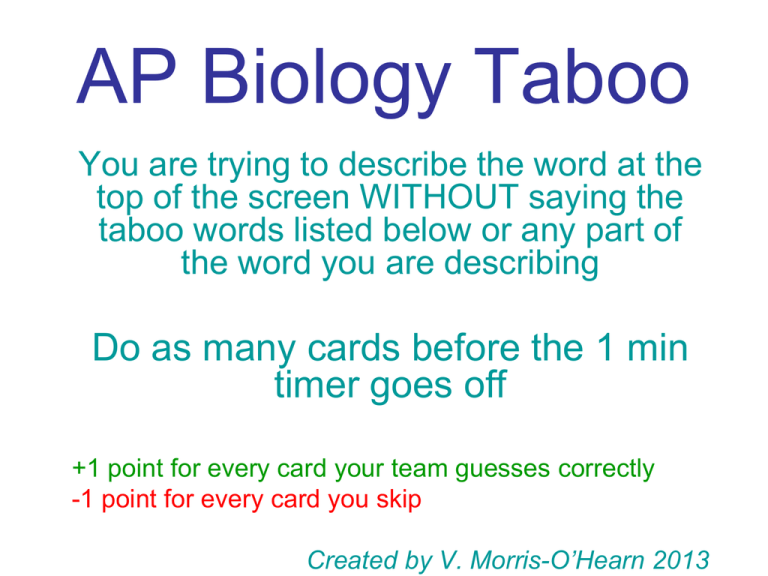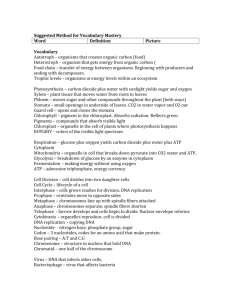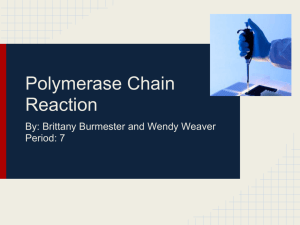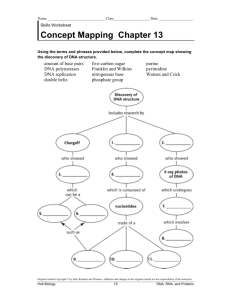AP Biology Taboo - wuerthapbiology
advertisement

AP Biology Taboo You are trying to describe the word at the top of the screen WITHOUT saying the taboo words listed below or any part of the word you are describing Do as many cards before the 1 min timer goes off +1 point for every card your team guesses correctly -1 point for every card you skip Created by V. Morris-O’Hearn 2013 Insulin • • • • • Pancreas Glucose Homeostasis Liver Blood Mitosis • • • • • Cells Body Somatic PMAT Identical Allopatric Speciation • • • • • Barrier Species Different Canyon Islands Amino Acid • • • • • Protein Ribosome Nitrogen tRNA mRNA Peptide Bond Protein Carbon Nitrogen Electrons Dehydration synthesis Hardy-Weinberg • • • • • Math p2, q2, 2pq Alleles Population Evolution Vestigial Organ • • • • • Unused Evolution Pelvis Appendix Tailbone Active Transport • • • • Low to high Concentration Membrane Protein channel • ATP Golgi • • • • • ER Packaging Secreting Proteins Vessicle Prokaryote • • • • • Bacteria No nucleus Simple Evolution Unicellular Cell Cycle • • • • • Checkpoints Mitosis G1, S, G2 Cancer DNA replication Anaphase • • • • • Chromosomes Poles Equator Chromatids Split Chloroplast • • • • • Plants Photosynthesis Green Stroma Matrix Mitochondria • • • • • ATP Cellular respiration Glycolysis Kreb’s Cycle ETC Anticodon • • • • • tRNA Ribosome Amino acid Protein Assemble Helicase • • • • • Unwind DNA Replication Bases Bond Mutation • • • • • DNA Mistake Polymerase Point Nonsense Active Site • • • • • Enzyme Protein Lock and Key Substrate Catalyst NADP+ • • • • • Electron Carrier Photosynthesis ETC ATP synthase Cell Mediated Response • • • • • Immune System Antigen Infected cell Antibody T cell Glucagon • • • • • Pancreas Glucose Homeostasis Liver Blood Neuron • • • • • Nervous System Communication Neurotransmitter Brain Axon Density Dependent Factors • • • • • Population Disease Predation Food Resources Exponential Growth • • • • • J shaped Graph Population Birth Death Succession • • • • • Fire Disturbance Volcano Soil Pioneer K species • • • • • Care Parent Offspring Less Lifespan Net Primary Productivity (NPP) • • • • • GPP Respiration Consumer Energy Passed on Nitrogen Cycle • • • • • Bacteria Soil Nitrates N2 gas Legume Carrying Capacity • • • • • Population Resources Limit Environment Deaths Innate Behavior • • • • • DNA Learned Unchangable Instinct Infant Homeostasis • • • • • Balance High Low Brain Hormones Water Potential • • • • • High Low Movement Pressure Solute Photosynthesis • • • • • Plants Choloroplast Light Glucose Calvin ATP Synthase • • • • • Enzyme Membrane ETC Photosynthesis Cellular Respiration Sex-Linked Genes • • • • • X Y Males Color blindness Carrier Independent Assortment • • • • • Meiosis Homologous Chromosomes Allignment Metaphase I Transcription • • • • • DNA RNA Polymerase Messenger Nucleus Operon • • • • • Bacteria Genes Grouped Lac Try Methylation • • • • • Cytosine Gene Off RNA polymerase Eukaryotes Introns • • • • • RNA snRP Processing Removing Junk Homeogenes • • • • • Same Species Conserved Similar DNA Okazaki Fragments • • • • • Lagging strand DNA Ligase Pieces DNA polymerase DNA Replication • • • • • Copying Semi-conservative DNA polymerase Identical S phase Meiosis • • • • • Cells Gamtes PMAT Variation Crossing over Hypertonic • • • • • Solute Water Water Potential Diffusion Osmosis Gene Flow • • • • • Migration Population Alleles Evolution Hardy-Weinberg Exocytosis • • • • • Cell Membrane Pinching Exiting Waste Fusing Transpiration • • • • • Water Stomata Cohesion Xylem Water Potential Cohesion • • • • • Water Sticky Negative Positive Surface tension Kreb’s Cycle • • • • • Mitochondria CO2 FADH2 Electrons Acetyl CoA Calvin Cycle • • • • • CO2 Rubisco G3P Glucose Stroma





